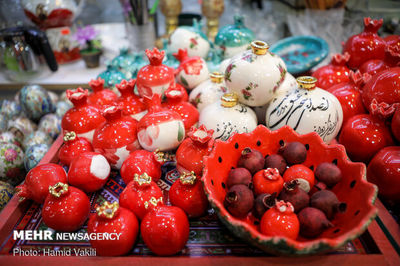In Iran, the longest night of the year, starting from the last day of fall (Azar 30th, December 20/21st) till the dawn of the next day (Dey 1st), has been celebrated as Shab-e Yalda since the ancient times.
During these days, Iranians celebrate in the absence of the sun and wait for the warmth and brightness of the dawn. Abooreyhan Biruni, the renowned Iranian scholar, calls it “Milad-e Khorshid” (meaning the Birth of the Sun). During the last decades, it has been also called Shab-e Chelle among the people and different ethnicities call it in a different name.
The ritual known as Shab-e Yalda was recognized around 500 BC during the reign of Darius I and was included in the Persian Calendar. On this night, people gather around in high spirits and celebrate until dawn; listening to the ancient stories and legends told by the elders.
Ceremonies like Fal-e Hafiz (auguring on the basis of Hafiz's omens), Reading Shahnameh, telling proverbs, etc. have become prevalent during this night. Pomegranate, because of its red color (the symbol of sun and mirth), watermelon as a summer fruit and the reminder of hot summer days, as well as nuts and other refreshments are used in circles for the reception. It has been said that the warmth of being together and passing time with the loved ones can eliminate the coldness of winter.
This 7000-year tradition has gone beyond the boundaries of Iran and has been discussed as a global intangible heritage, intended to be inscribed in UNESCO world heritages in 2021.
The tangible and intangible heritage of each country is considered as its historic identity, and the authorities try to attract more tourists to their countries through inscription of their cultural and historical heritages in global lists.
Given the importance of protecting intangible heritage and in line with the Heritage, the Ministry of Cultural Heritage, Tourism and Handicrafts is making efforts to inscribe Shab-e Yalda on UNESCO Intangible Cultural Heritage List in 2021.
Till now, Iran has managed to inscribe 14 intangible heritages, the last of which has been Iran’s traditional skills of crafting and playing the Dotar (string instrument), registered during the 14th session of Intangible World Heritage Committee in Colombia.
However, it should not be forgotten that people play a vital role in safeguarding the ancient heritage of Yalda. The elderly know many secrets about various cultures and traditions related to this night and can help the inscription of this heritage as its narrators. Only then the tradition can be transferred to the next generations in an intact and perfect way.
Piece contributed by Seyed Amin Saneey Mehri, Deputy of PR and Information Center at the Ministry of Cultural Heritage, Tourism and Handicraft
Source: Mehr News

